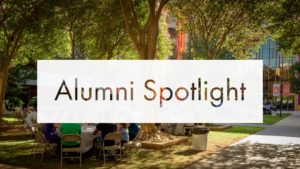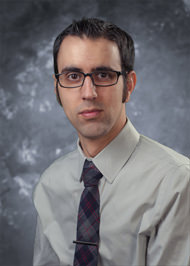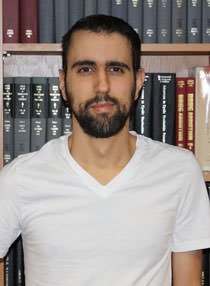Alumni Spotlight: Dr. Fernando B. de Moura Works as a Postdoc at McLean Hospital/Harvard Medical School

 Dr. Fernando B. de Moura works as a postdoctoral fellow at McLean Hospital/Harvard Medical School. He graduated in 2017 with a Ph.D. in Pharmacology.
Dr. Fernando B. de Moura works as a postdoctoral fellow at McLean Hospital/Harvard Medical School. He graduated in 2017 with a Ph.D. in Pharmacology.
When did you first become interested in science?
My path into science was convoluted. I grew up with my father, who is a mathematician, and in youth, his two significant others (including his wife) were/are both biologists. My mother is a computer scientist that works with programing systems for analysis in the human genome project. Her husband is a physical chemist. So, science has really inundated my life, and because of that, like all rebellious teenagers, I initially when to school to be anything but my parents. In that regard, I started my education in a pre-law track at the University of Michigan. However, a while into my liberal arts education, I realized that it was not for me. So I dropped out of school for a few years and pursued a career in music, working odd jobs here or there (e.g., being a waiter, bicycle delivery, landscaping, and so on). Around 2006, I became more aware of the heavy toll that addiction and alcoholism played on my immediate and distant family both here and America, and back home in Brazil. It was then that I decided I wanted to try to do something about that. In 2007, I transferred to the University of Texas at San Antonio in the hopes to become a Licensed Chemical Dependency Counselor. While I was doing my transfer, the dean of the Honor’s Program, Dr. Ann Eisenberg, asked me what if I was interested in joining the Honor’s Program, and I said sure. In talking to her, I mentioned that I was interested in drug abuse and alcoholism, and she mentioned that there was a summer internship sponsored by the National Instituted on Drug Abuse (NIDA). I applied, got in, and worked in a lab of Dr. Jia Bei Wang at the University of Maryland-Baltimore in the summer of 2008. There, I was tasked to work projects of both a behavioral and a biological nature. Those three months there was my first real exposure to bench-top science, and I absolutely loved it. That was the time I realized I wanted to do science, and I haven’t looked back yet.
Why did you pick The University of Texas Health Science Center at San Antonio and your program?
Transferring to UTSA to complete my undergraduate education was very serendipitous inasmuch as I was able to do my honor’s thesis research at UT Health San Antonio in the lab of Dr. Martin Javors. There I became familiar with absolutely outstanding behavioral pharmacology program there. It became pretty clear to me early on that behavioral pharmacology was the type of research I wanted to do. During the graduate school interview process, I met with Drs. McMahon (who was my Ph.D. advisor), France, and Gerak, and these discussions really reinforced my view that UT Health San Antonio was my top choice. The research being conducted at UT Health San Antonio in drug abuse and behavioral pharmacology is second to none, and I can tell you as someone that is still in the field of behavioral pharmacology, the pharmacology department at UT Health San Antonio has a sterling reputation.
Tell me more about your career path.
 Well, I did a little of that above, but to expand: as an undergraduate, I did research in the Department of Psychiatry at UT Health San Antonio with Dr. Martin Javors using quantitative HPLC to analyze the metabolism of nicotine in tobacco users undergoing an abstinence program. I moved to New York City after college for my wife to go to graduate school, and I worked at Hunter College, in the Department of Chemistry in the lab of Dr. Mandë Holford. I was the lab manager there, so I was tasked to do a whole lot of administrative things (e.g., ordering supplies, managing funds, etc). But I was involved in a long project developing ways to clone and screen toxins from terebridae snails. I moved back to San Antonio to start graduate school in 2012, and in the lab of Dr. Lance McMahon (who left UT Health San Antonio last year to become chair of the Department of Pharmacodynamics at the University of Florida’s School of Pharmacy) I utilized the principles of behavioral pharmacology to elucidate the in vivo receptor pharmacology of nicotinic drugs in mice. From there, I moved to the Boston area to do my postdoc, where I am a Livingston Fellow in the Department of Psychiatry at Harvard Medical School, with a hospital appointment in the Preclinical Pharmacology Program at McLean Hospital.
Well, I did a little of that above, but to expand: as an undergraduate, I did research in the Department of Psychiatry at UT Health San Antonio with Dr. Martin Javors using quantitative HPLC to analyze the metabolism of nicotine in tobacco users undergoing an abstinence program. I moved to New York City after college for my wife to go to graduate school, and I worked at Hunter College, in the Department of Chemistry in the lab of Dr. Mandë Holford. I was the lab manager there, so I was tasked to do a whole lot of administrative things (e.g., ordering supplies, managing funds, etc). But I was involved in a long project developing ways to clone and screen toxins from terebridae snails. I moved back to San Antonio to start graduate school in 2012, and in the lab of Dr. Lance McMahon (who left UT Health San Antonio last year to become chair of the Department of Pharmacodynamics at the University of Florida’s School of Pharmacy) I utilized the principles of behavioral pharmacology to elucidate the in vivo receptor pharmacology of nicotinic drugs in mice. From there, I moved to the Boston area to do my postdoc, where I am a Livingston Fellow in the Department of Psychiatry at Harvard Medical School, with a hospital appointment in the Preclinical Pharmacology Program at McLean Hospital.
Tell me about your current career, what do you do?
The research I am doing here at Harvard/McLean is varied. I am still doing work in behavioral pharmacology, continuing my pursuit of investigating the molecular and biological mechanisms of drug abuse. However, I have also developed an interest in studying novel methods for the management of pain. I also have been using theories in behavioral economics to elucidate the abuse-related effects of psychomotor stimulants. Another project that is very exciting that I am conducting is investigating the neural mechanisms of drug self-administration in rhesus monkeys utilizing functional magnetic imaging.
What is a day like in your job?
If I had received this questionnaire just a few months ago, I would be giving a very different answer. Recently, I have started transitioning away from doing the day-to-day hands-on bench-top science, and have started to focus my efforts on grant writing, publishing manuscripts (which I am woefully behind), and data analysis. This is possible because I have two amazing and talented technicians that run experiments that I oversee. I generally spend my mornings running one of the more complicated experiments that I am conducting, and then after that, I spend most of my day writing and going to meetings/seminars. Since a good amount of the equipment we use for our research here is custom-made, I spend a good amount of time each week doing repairs. I spend a portion of each day speaking with the technicians (Dan and Maggie) that assist me with my research to offer help if they need it and discuss research and future plans, as well as answer any questions. My job also usually doesn’t end when I come home. I use my time after dinner to do a good bit a writing as at home, as I have more dedicated time to work on writing.
How did the education you get at The University of Texas Health Science Center at San Antonio prepare you?
Right off the bat, I must say I had amazing mentorship at UT Health San Antonio. My advisor Dr. McMahon was great, and really allowed me more intellectual freedom that I probably would have allowed myself. He did, of course, provided me with feedback, and subtle guidance when needed (which was often). I had an amazing dissertation committee of Drs. Charles France, Lyn Daws, and Bill Clarke, who all really made sure that I learned the in’s and out’s of pharmacology. The lab meetings I had with the behavioral pharmacology group at UT Health San Antonio provided me with ample opportunity to learn the complexities of behavior and pharmacology, and provided me with keen insight on how to investigate issues on drug abuse. Most importantly, the mentorship I received at UT Health San Antonio also taught me not only how to look at data, and the small minuscule things that really seem to excite us as scientists, but also to look at the bigger picture, and use my data and the scientific literature to investigate new and exciting problems in the world of drug abuse.
What is the most challenging part of your work?
Work-life balance. Or is it life-work balance? Or maybe just work-work balance? Mainly, just getting everything I want to do finished.
What is the most rewarding part of your work?
The science. It’s easy for me to get lost in my science. I love looking at data, talking about data, generating data, and tackling complex issues and troubleshooting. Really, just being a scientist is exhilarating.
What has been your proudest achievement?
In my first year of my postdoc, I won a prestigious fellowship (The Livingston Award) from the Department of Psychiatry at Harvard Medical School. That was the proudest achievement in regards to my ego. Scientifically, the first time me and Dr. Stephen Kohut (one of my two postdoctoral mentors- the other being Dr. Jack Bergman) got a rhesus monkey to self-administer cocaine inside and fMRI was a moment I will never forget in my life.
What would you tell a current student interested in your career? Any advice?
Well, scientifically, I would tell them to be patient. Experiments take time, and learning (which is the crux of scientific achievement) is continuous process.
Professionally, I would suggest that they apply for everything possible. Every fellowship, travel award, poster competitions, etc. I would suggest they attend every conference possible, and be an active participant. Identify people at conferences that you admire/respect, and whose lab may interest you for a postdoc. And then speak with them. Make yourself known, and also show a willingness to be better. Ask questions, even if you’re afraid they may sound “dumb.” It is better to ask and know, than to actually do something incorrect.
What do you like to do outside of work?
Hmm… sleep? I spend most of my day some what involved with my work. But I do enjoy watching sports and hanging out with my wife on the rare occasions that we both have time off from our respective jobs.
Have a question for Fernando? Ask him at www.gsbsalumni.com.
